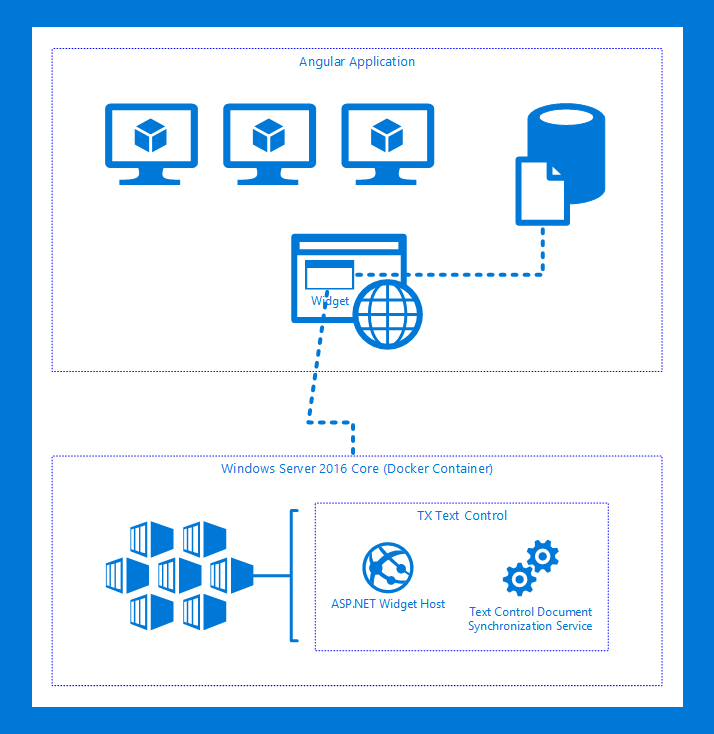This blog post contains outdated information.
The cited code snippets may be workarounds, and be part of the official API in the meantime.
Deploying an Angular Application using the TX Text Control Widget
This article gives an overview of a typical deployment structure when using the TX Text Control widget within an Angular application.

The HTML5-based rich text editor Web.TextControl is part of the product TX Text Control .NET Server available for ASP.NET MVC and Web Forms. The unique advantage of this technology is the 100% compatibility with other platforms of TX Text Control such as Windows Forms and WPF and the true WYSIWYG rendering.
Documents can be displayed and edited in the same way like in rich or thick client applications. In order to realize this, a server-side component is required to synchronize documents and to provide server-side fonts and rendering details identically across platforms and browsers.
In order to use TX Text Control in Angular applications or any other platform, we created a widget that encapsulates the editor and exposes a JavaScript API. This widget can be embedded in any HTML page or Angular application. The following article shows how to create a simple Angular application with the widget:
Create your First, Very Simple Angular Application with the TX Text Control Widget
When deploying your application, a separate server or server-cluster (depending on your server load) is required for the word processing part. You can host the TX Text Control widget and the requirements on a Windows Server 2016, a VM or create a VM by using a Docker Container for easy deployment or deployment through Azure Service Fabric.
The following diagram shows this deployment architecture. The Angular application hosts the TX Text Control widget that runs on a separate server. Documents are loaded directly using JavaScript from your document database or file system in your Angular application structure.

If you additionally use the TX Text Control document API such as TXText
If you are thinking about migrating your thick client application to the web, let us know. With our experience, we would love to help you with this process.
Also See
This post references the following in the documentation:
TX Text Control .NET Server
- TXText
Control. Web. Text Control Class
TX Text Control .NET for Windows Forms
- TXText
Control. Document Server. Mail Merge Class - TXText
Control. Server Text Control Class
Jump to the other posts in this series:
- Create your First, Very Simple Angular Application with the TX Text Control Widget
- Deploying an Angular Application using the TX Text Control Widget
Angular
Integrate document processing, editing, sharing, collaboration, creation, electronic signatures, and PDF generation into your Angular Web applications.
Related Posts
Integrate Document Editing into any HTML Client using the HTML Widget
The HTML widget can be used to integrate document editing into any HTML client including vanilla HTML, Angular, node.JS and any other client-side framework.
Create your First, Very Simple Angular Application with the TX Text Control…
This tutorial shows how to create a first, very simple Angular application with the TX Text Control Widget.
Building an ASP.NET Core Backend (Linux and Windows) for the Document Editor…
This article shows how to create a backend for the Document Editor and Viewer using ASP.NET Core. The backend can be hosted on Windows and Linux and can be used in Blazor, Angular, JavaScript, and…
Impressions from .NET Developer Conference DDC 2024
This week we sponsored the .NET Developer Conference DDC 2024 in Cologne, Germany. It was a great event with many interesting talks and workshops. Here are some impressions of the conference.
Back from Florida: Impressions from VSLive! Orlando 2024
We had an incredible time showcasing our digital document processing SDKs at VSLive! Orlando 2024 as a silver sponsor! Throughout the event, we interacted with hundreds of developers, shared…

